Guide to moving into university hall at NUS
If you’re en route to university, I’m sure your seniors have mentioned the excitement that is campus life. Summer break is when hostel applications become a big hoo-ha, and if you’re feeling the confusion like I once did, here’s a NUS hall guide, from how to apply to what to pack for your move-in day.
Table of Contents
- Guide to moving into university hall at NUS
- The types of university halls at NUS
- What should I know before applying for university hall?
- What can I expect from the different university halls?
- Compulsory meal plans
- How & when do I apply to stay on the NUS campus?
- What university camps should I join?
- Making friends in hall
- What should I pack to move in university hall?
- Is staying in a university hall at NUS worth it?
The types of university halls at NUS
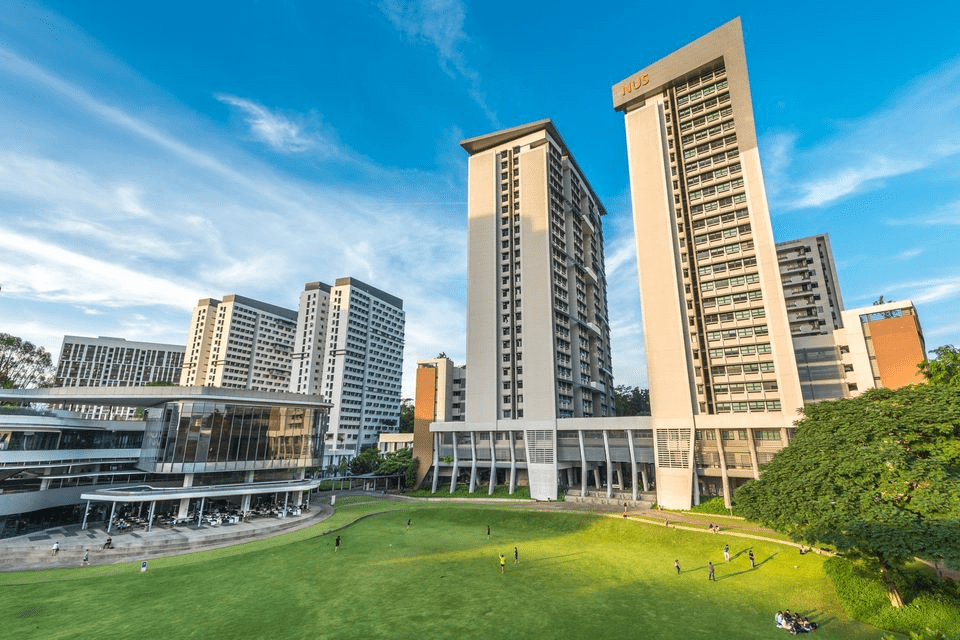
Image credit: UTown Residence via Facebook
There are 4 types of hostels for NUS students to choose from: Halls of Residence, Residential Colleges, Houses, and Student Residences.
| Hostels | Room types |
| Halls of Residence | Single, double |
| Residential Colleges (RCs) | Single, double (Ridge View Residential College only) |
| Houses | Single |
| Student Residences | Single, twin-sharing apartment, studio apartment |
What should I know before applying for university hall?

Image credit: NUS
Visit the hostels before applying for them. You’ll be living there for some time, so you should make sure you like the environment. Hostels usually organise open houses before the application window to take incoming freshmen on tours of the accommodations and facilities.
The tours are guided by current residents, so it’s the best time to ask them just about anything. If you’re still unsure about staying on campus, ask them for advice and get them to share their personal experiences. If you want to join specific CCAs, it’s also good to ask about the commitment levels and training schedules.
What can I expect from the different university halls?
Halls of residence
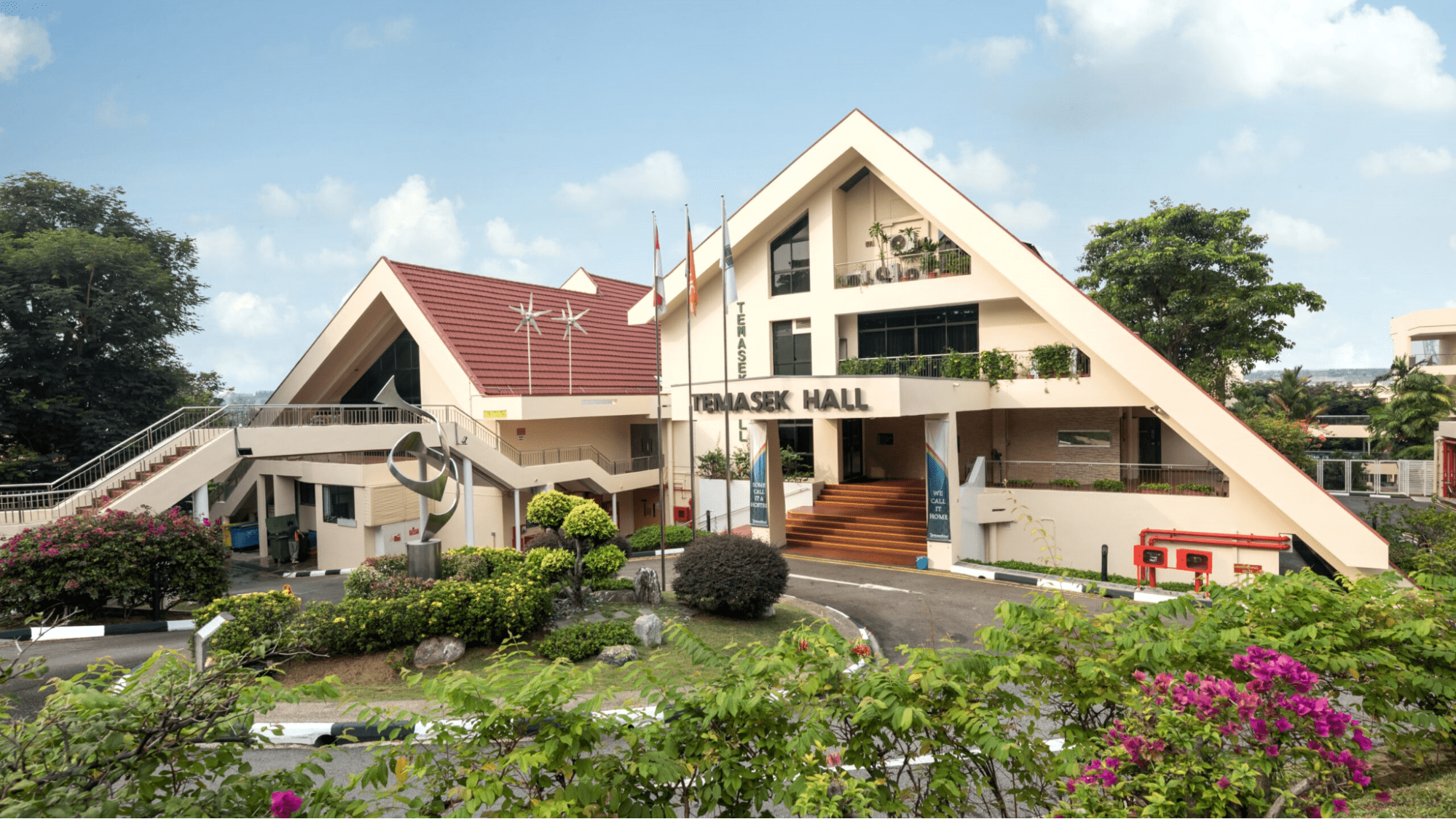
Image credit: NUS OSA
| Hall | Rooms | Weekly rates | Known for | Nearest to |
| Eusoff
|
|
Single: $139
Double: $96 |
|
|
| Temasek | ||||
| Raffles |
|
|
||
| King Edward VII |
|
|
||
| Sheares
|
|
|
||
| Kent Ridge |
NUS is home to 6 halls of residence. The most popular option among undergraduates, halls are best known for being community-driven and offering a vibrant range of CCAs, including sports, culture clubs, and committees.
Sadly, getting in as a freshman doesn’t guarantee a stay for the entirety of your university life, so chionging for CCAs is often essential for earning points to secure a spot for the following year. Each hall has different ways to collect points, but to be safe, we’d advise taking up at least 3-4 CCAs, preferably one with a leadership position.
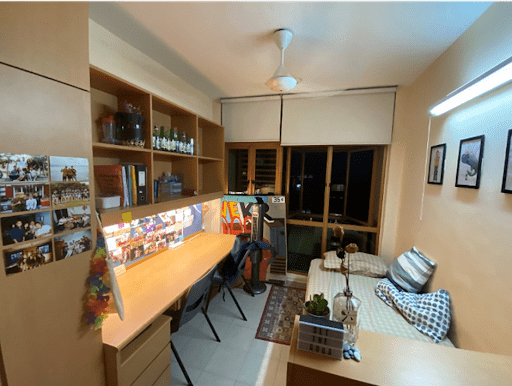
Image credit: NUS OSA
The layout of the rooms is similar across all halls: a single bed, table, wardrobe, and shelves. Fair warning, though, hall rooms are not air-conditioned. There are different blocks for each hall, and genders are sorted according to levels. For double rooms, strictly same-gender roommates are allowed. Don’t worry, though, communal toilets are available on every level.
Halls are also typically the more “happening” areas on campus. Be prepared for a super active social life. Block events, late-night study-turn-HTHT sessions, and spontaneous supper jios are the norm when living in hall. Many students consider these experiences to be the highlight of their university life.
Residential colleges

Ridge View Residential College.
Image credit: NUS OSA
| Residential College (RCs) | Rooms | Weekly rates | Theme | Nearest to |
| College of Alice and Peter Tan
|
(AC & non-AC) |
RCs hostel rates | Community engagement | UTown |
| Tembusu College | Diverse and inclusive, global affairs | |||
| Residential College 4 |
(AC) |
Systems thinking | ||
| Ridge View Residential College |
(AC & non-AC) |
Sustainability | Faculty of Science |
If you’re more of an introvert and just not cut out for too much of the rah-rah lifestyle, you may want to consider residential colleges (RCs). RCs require fewer commitments since you’re guaranteed a 2-year stay upon acceptance. They also focus more on community engagements and interest groups.
RCs are unique because residents must participate in academic pursuits according to each hostel’s theme. So, instead of earning points for hall, you’re expected to clear 5 modules in RCs. They are part of the University Town College Programme and can be used to replace general education modules, a university-level requirement. Yay to less workload!
But that doesn’t mean it’s any less fun. Although CCAs are not a requirement, RCs offer a bunch of activities for you to take part in. There are interest groups ranging from arts and sports to clubs and societies that welcome all residents to join.
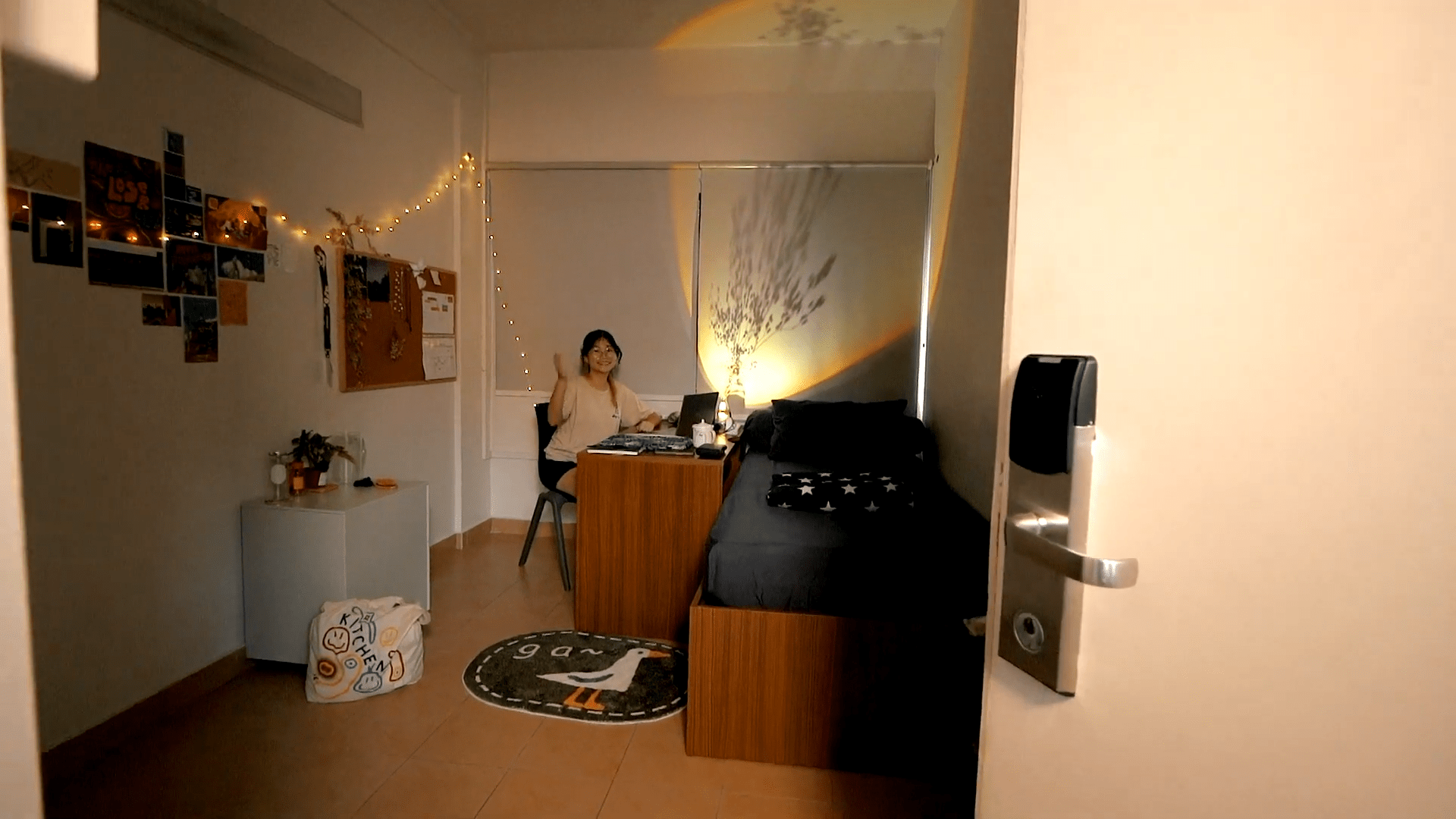 Image screenshotted from: Ridge View Residential College via Youtube
Image screenshotted from: Ridge View Residential College via Youtube
RC rooms are pricier than halls as they are newer and have better facilities. All the rooms are single occupancy, with Ridge View Residential College (RVRC) being the only RC with double rooms. You can choose between an air-conditioned room or not – the former operates on a pay-as-you-use scheme. Like most campus accommodations, toilets are also communal on every level.
However, some of the RCs offer 6-bedroom apartments with 6 single rooms, a shared bathroom, and a common living area.
Houses

Image credit: NUS OSA
| House | Rooms | Weekly rates | Activities | Nearest to |
| Pioneer house
|
Type C (single rooms) | AC: $172
Non-AC: $152 |
|
|
| Lighthouse | ||||
| Helix house |
NUS houses are the way to go if academics are your number 1 priority and you’re planning to mug through your university years. The 3 houses offer a stress-free and non-competitive stay, as residents are not required to join CCAs or any study programmes.
The houses offer their own interest groups and community practices, so students have the option to take time off studying and spend time with peers. Priding themselves on a supportive community, freshmen can look forward to initiatives like the peer mentorship programme in Pioneer House or the coaching and mentoring scheme at Lighthouse.
Senior retention happens when you want to continue your stay the following year. It differs for each house, but the baseline is to participate and be involved during your 1-year stay here. The application process requires recommendations from 2 to 3 residents to vouch that you’re a valued community member.
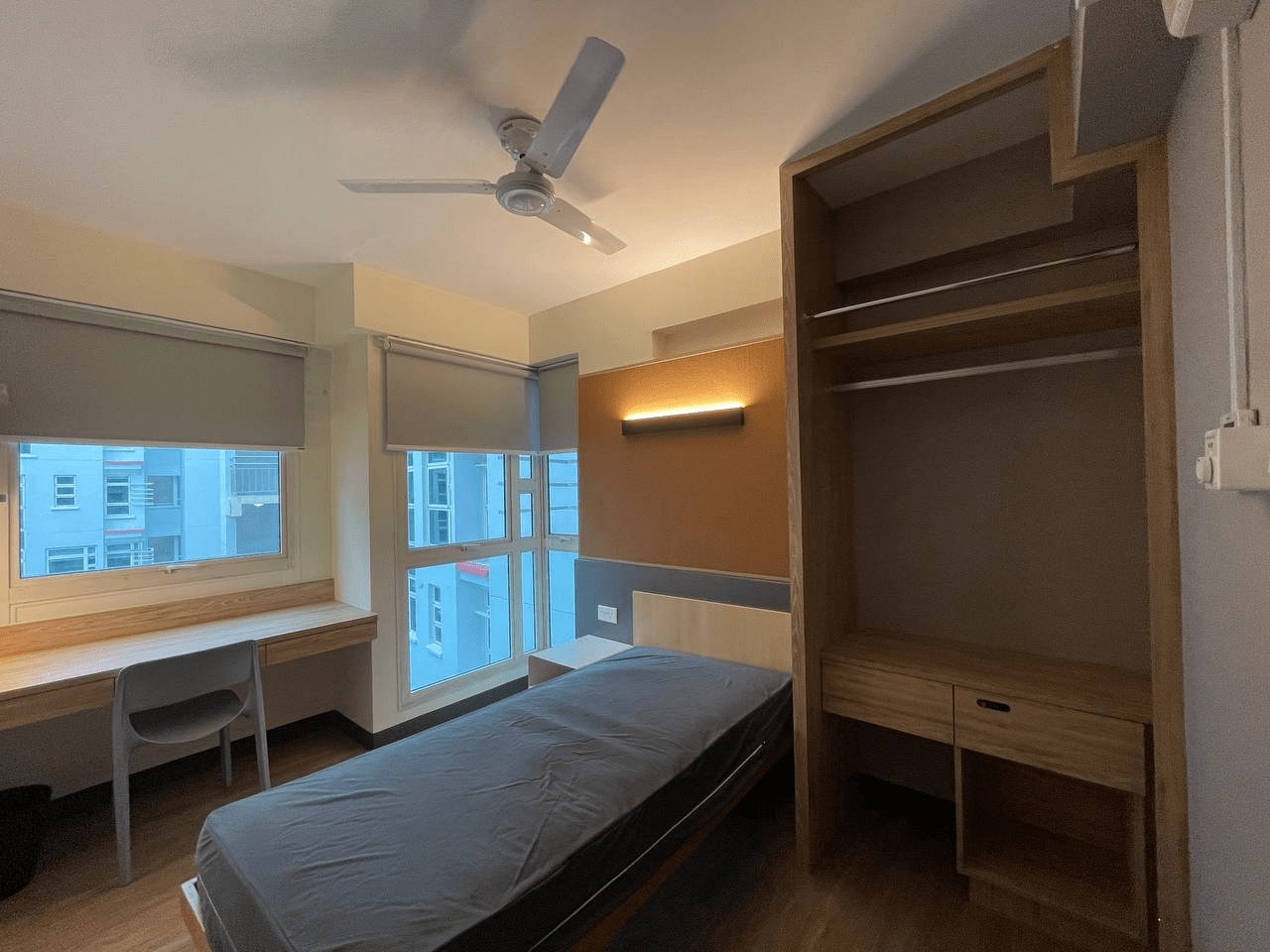
Helix House single room.
Image credit: NUS OSA
The rooms here are simple and minimally decorated. They are all single rooms with the option of air conditioning. Once again, communal toilets and kitchenettes are located along the common corridors.
Student residences
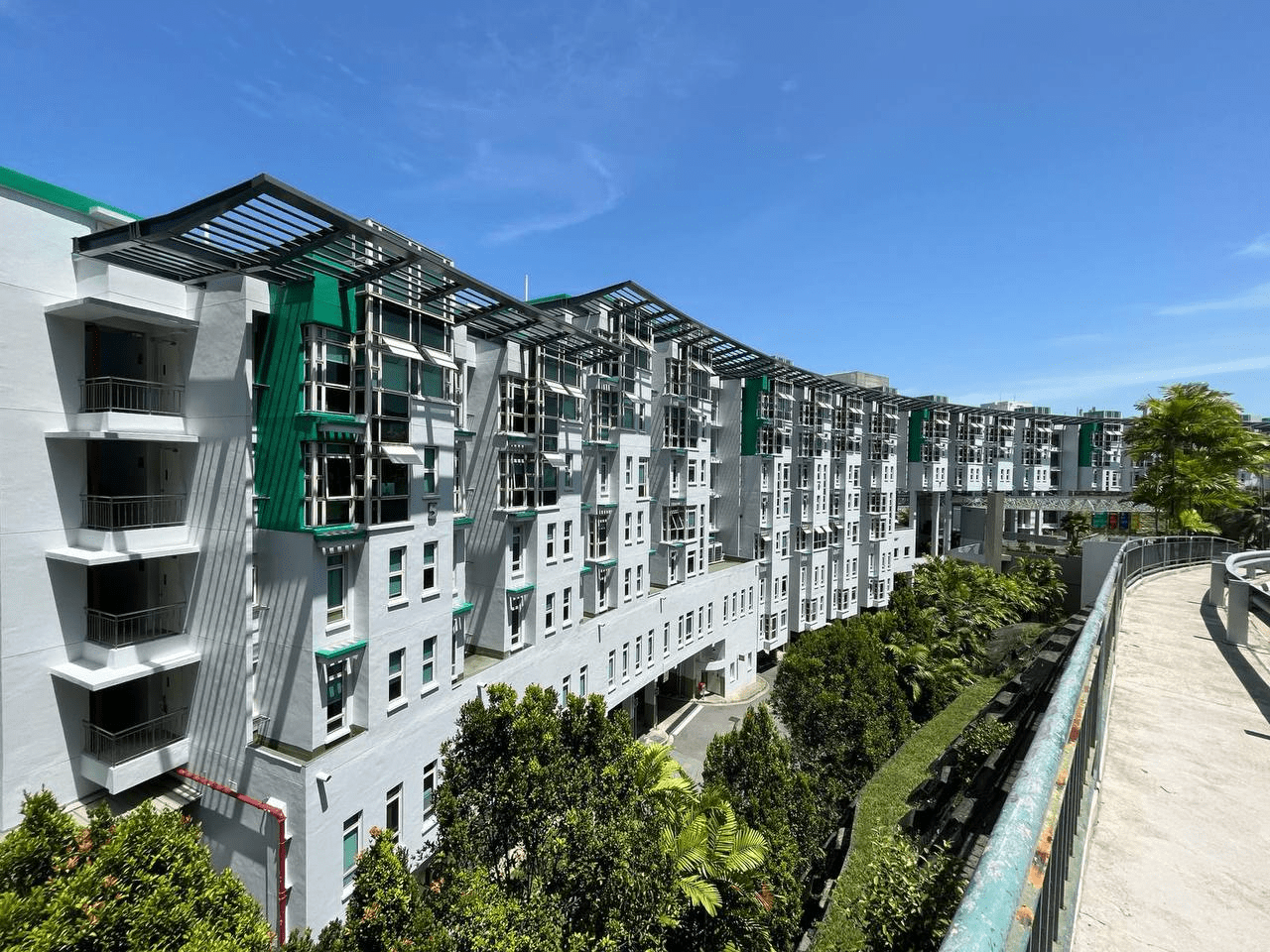
Prince George’s Park Residences.
Image credit: NUS OSA
| Student Residence | Rooms | Weekly rates | Activities | Nearest to |
| Prince George’s Park Residence
(PGP) |
(AC & non-AC) |
Student Residence hostel rates | Residence events | NUS Business School |
| UTown Residence |
(AC & non-AC) |
UTown |
The 2 student residences on the NUS campus are reserved for undergraduates onwards from year 2; first-year students are not eligible to apply for a stay. Application processes tend to be competitive, with the bulk of residents being varsity, scholarship holders, and exchange students. So, do go for it if you have impressive co-curricular or academic records.
Hostel activities are optional, with a focus on community-building activities such as wellness sessions and group exercises. Generally, these accommodations offer more privacy and flexibility of schedules.
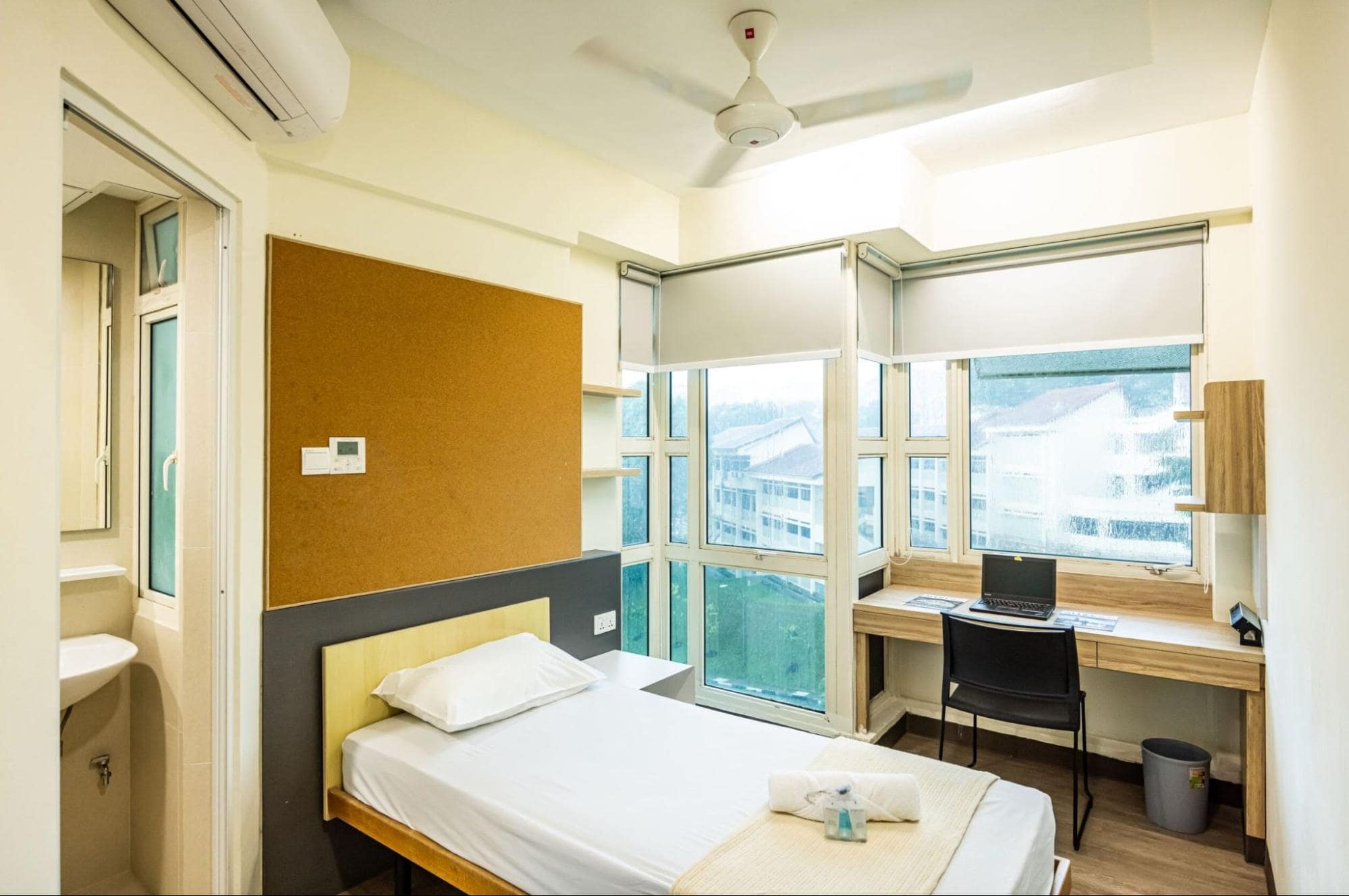
PGP’s type A room.
Image credit: NUS OSA
There are 3 types of single rooms for Prince George’s Park Residence (PGP): Type A is an air-conditioned space with a private bathroom, while Type B is non-air-conditioned and equipped with a sink. Finally, Type C is a standard single room with air-conditioning options.
The layout of the 4-bedroom and studio apartments in UTown Residence is similar to typical Singapore flats, with a common living area, kitchen space, and bathroom. These rooms are ideal for graduate students or married couples taking their master’s or PhD.
Compulsory meal plans
All residents staying in halls and RCs are subject to compulsory meal plans. The subscription offers 6 days’ worth of breakfast and dinner with halal, non-halal, and vegetarian options across different cuisines.
| Hostel | Meal plan rates/semester* |
| Halls of Residence | $671 |
| Residential Colleges | $1147.77 |
*Rates are accurate as of AY24/25 Semester 1.
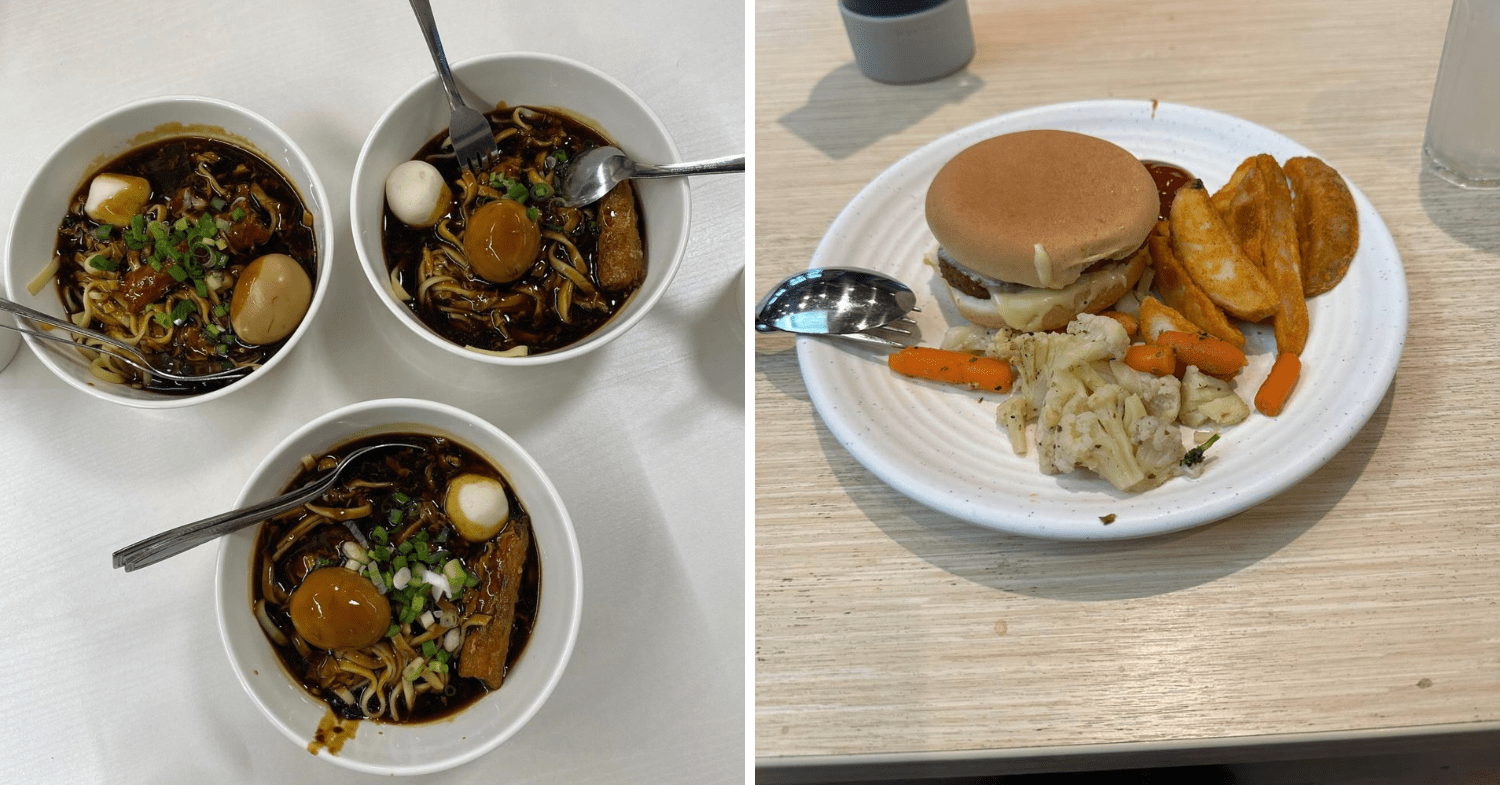
Left: Raffles Hall breakfast, Right: CAPT dinner.
Image adapted from: Kelly Lai, Melden Koh
The meal plans in RCs are more expensive as the food is of a wider variety and better quality. Meals in the hall are usually limited to 1 or 2 options, while RC’s dining hall serves different cuisines across Western, Chinese, and Malay. We broke it down, and each meal averages around $3-$5. This saves you a ton of money compared to eating out, so there’s really not much to complain about.
There are tons of mixed reviews about the taste of the food. Many of my male friends compared it to the meals they had during their National Service, but to each their own. From personal experience, the hall food was alright. It was on the saltier side, but nothing bad or crazy.
How & when do I apply to stay on the NUS campus?

Students can apply for a hostel stay via the UHMS student portal with their student ID. Only full-time students registered with NUS are eligible. International students who hold ICA or MOM-approved passes during their hostel stay are also eligible for a spot.
The registration dates differ each year, but applications for Semester 1 are usually due in March for undergraduates. However, applying to hall as an undergraduate may be trickier since slots are mainly open for freshmen. Having NUS co-curricular activity (CCA) records and achievements may aid your chances of getting accepted.
First-year students can start applying to halls and houses from June to July. Freshmen have higher chances of getting a stay, but each hostel has its own culture or specific criteria they look out for. For instance, some halls prioritise those who play sports or have a dance background.
Residential Colleges (RCs) are only open to freshmen and have an earlier application period from March to April. You must apply for the Joint Residential College Admission System, and you can state your preferred RC, where you’ll then be required to write an essay before being shortlisted for an interview.
Semester 2 applications are a shorter process in November, and are open to all undergraduates.
What university camps should I join?
Now, there are so many different camp names floating around that you might need help to wrap your head around which ones to join. I’ve been there, and it gets overwhelming, especially if you’re a freshman. For hostels, the 2 main types are the engagement camps and orientation camps.
Engagement camps
 Image credit: @nus_singapore via Instagram
Image credit: @nus_singapore via Instagram
Engagement camps are more for halls and are held during the application period in early June. They last 2-3 days and are meant for freshies to have a glimpse of hall life. You get to experience different cultures and mingle with seniors, which can be helpful if you’re still unsure or torn between the different halls.
Some halls’ engagement camp dates may clash, so attend your first choice. Each hall’s Instagram page usually provides regular updates about its sign-up links, which typically open around mid-May.
Orientation camps
 Image credit: @rhfiversstreet via Instagram
Image credit: @rhfiversstreet via Instagram
Orientation camps happen after you are accepted into the hostels. They are meant to help freshmen move into their new homes, so join them if you can! Usually held a week before the semester starts, these camps are the best way to familiarise yourself with the hall facilities and meet fellow residential mates or seniors from the same course.
Rag & Flag
One of the most popular events in NUS is Rag & Flag. The annual event, an important aspect of the freshmen orientation program, is a charity project that encourages the student community to help the less privileged. Flag is one of the largest university fundraisers in Singapore, and Rag – which stands for Receiving and Giving – encompasses live performances to thank everyone for their fundraising efforts.
Every faculty and hall has its Rag & Flag run by undergraduate student committees. Freshmen can either join Flag or any of the 3 categories in Rag: dance, costumes, and floats. Be aware that the programme requires high-commitment, with dance practices or costumes and prop-making sessions spanning 2-3 months throughout the summer.
Sign-ups start around early June. Joining Rag & Flag is one way of interacting with seniors or already residents, and having them vouch for you during the selection process helps increase your chances of securing a stay at one of the NUS halls.
Making friends in hall
 Image credit: NUS OSA
Image credit: NUS OSA
Don’t fret about making friends when you’re on campus. The shared spaces and close proximity to fellow students will make it easy for you to form new friendships. Even if you’re not the most outgoing, a simple chit-chat with your neighbours or floor mates can lead to lasting connections.
The other way to increase interactions is to participate in activities or join clubs that spark your interest. Events such as night cycling and inter-block games are held during the first semester and offer great bonding sessions to find like-minded friends.
We also recommend going for block events. The block committees organise regular themed nights with fun activities and free food. Who’s saying no to that?
What should I pack to move in university hall?
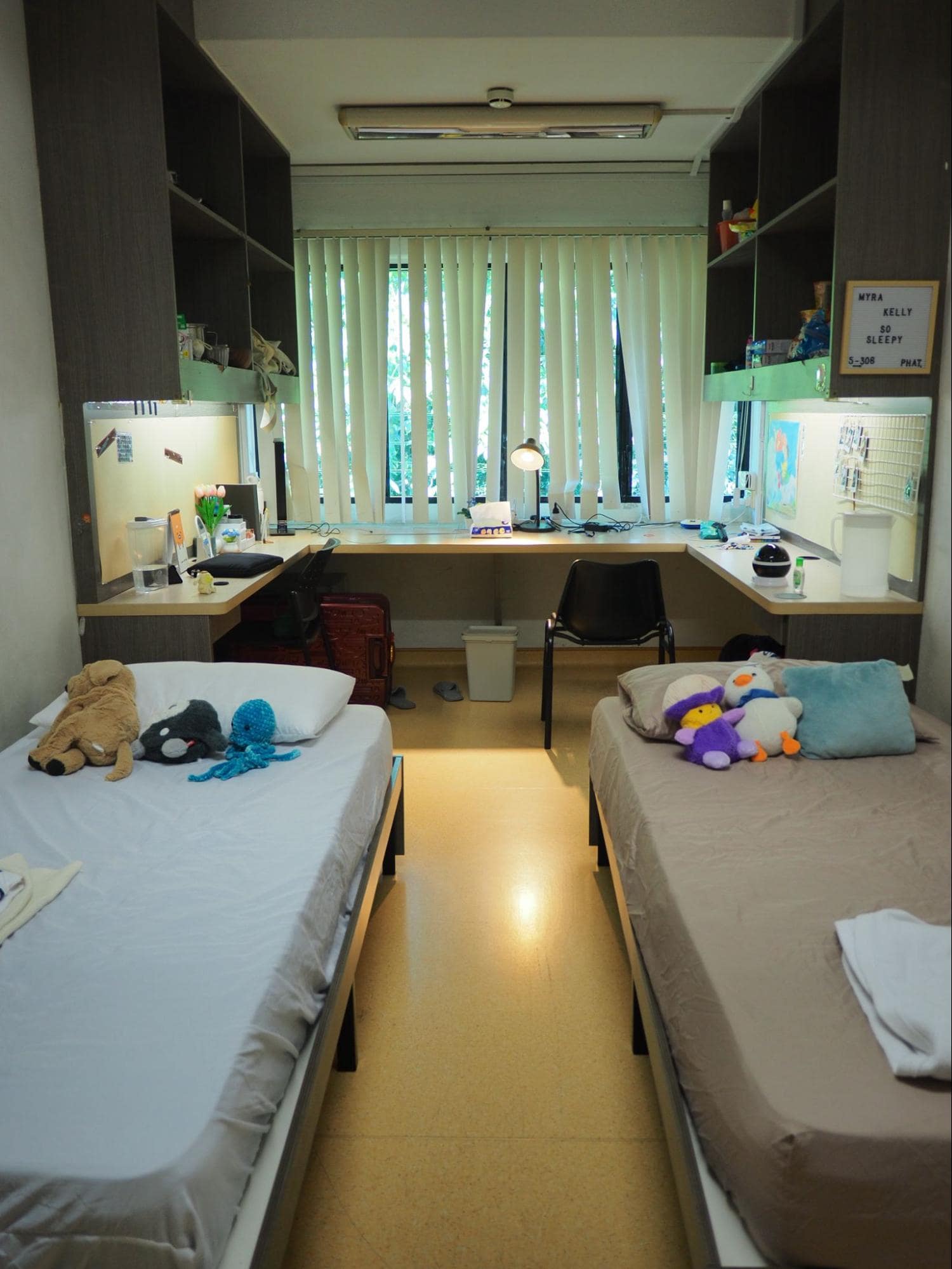 Raffles Hall double room.
Raffles Hall double room.
Image credit: Kelly Lai
Instead of lugging all your suitcases with you, just pack the bare essentials on move-in day and save the fairy lights and posters for another trip; you have the whole semester to move in anyway.
Most importantly, make sure you have cleaning supplies on hand. The rooms are usually quite dusty and will require a thorough deep clean, so bring pails, disinfectant wipes, and rags. Having a mop or handheld cordless vacuum is also a lifesaver.
For toiletries, store all your bathing essentials in a shower basket. The communal toilets have cabinets, so you can chope a spot for your basket so you won’t have to carry it in and out of your room. Bring a pair of slippers you won’t mind getting wet so you can wear them into the shower.
@jermaine.yjm playing around with my capsule wardrobe in hall!! #singapore #outfit #fitcheck #outfitideas #outfitinspo #sgfashion
Building a capsule wardrobe is a game changer when staying in a hall. Play around with basic pieces so you won’t have to bring your entire wardrobe from home with you. I’d recommend at least a week’s worth of clothes to save yourself a laundry trip.
Speaking of laundry, the washing machines have a “pay when you need” system, priced from $1 per cycle. Have a basket to chug all your dirty clothes in one place and also detergent, duh. Optionally, you can also bring a drying rack, but most hostels have dryers to save you the hassle of hanging your wet laundry.
Other miscellaneous items that are good to have are:
- A mini trash can
- Containers to dabao food
- A diffuser to keep your room smelling fresh
- Insect repellent
Lastly, most halls and RCs are not air-conditioned, so you may want to get a desk fan or portable aircon – just be sure to declare it. You can find them for cheap on Carousell.
Is staying in a university hall at NUS worth it?
 Image credit: @nuspresident via Instagram
Image credit: @nuspresident via Instagram
If you’re still deciding on whether staying on campus is for you, here are some pros and cons you may want to consider.
Pros of staying in university hall
- Staying on campus saves on travelling time – especially sweet if you have classes in the early mornings. It also makes sense to opt for hall if your house is far from NUS. You’ll be able to get to class in 15 minutes or less, which means you get more much-needed rest.
- Staying on campus opens up a world of social opportunities. You’ll be able to build friendships and create unforgettable memories before stepping into the professional world after graduation.
- You get to save up on your meals. The meal plans are rather filling, and you can even dabao breakfast for lunch sometimes if you’re really trying to get the most bang for your buck. For houses and student residences, the PGP canteen also offers meals ranging from $4 to $5.
- Staying with others improves connections, especially with seniors in the same courses. They’re the ones to turn to for academic help or general matters, such as planning for internship or overseas exchange.
Cons of staying in university hall
- An obvious one is the time you’re spending away from your family. Because of the convenience that is a campus stay, you’ll usually only be home during the weekends.
- The high commitment to hall life makes it easy to get consumed by all the activities, and some may find it a struggle to balance academics and hall commitments. Here’s some tips from previous hall-stayers:
- Head to study spots around the school instead of studying in the room. You’ll be away from friends or any ongoing events, AKA lesser distractions.
- Make breakfast plans with friends so there’s some accountability. This motivates you to get up early and ensures you won’t sleep through your alarms and miss any lessons.
- Hostel stays can get pricey depending on the rooms you choose, and they are an additional fare on top of your school fees. The rates have also increased throughout the years, but students can apply for financial aid or scholarships to ease the financial burdens.
- Lastly, if you opt for a shared room, there’s no guarantee you’ll get a good roommate and so it’s up to you to decide how much of an adjustment you’re willing to make.
Know which university hall is best for you
Circumstances play a part, so if you’re looking at long commuting hours or a jam-packed timetable, university halls might be a good option. Otherwise, staying on campus adds to the already exciting university life NUS has to offer, and is one of the best ways to forge long-lasting friendships.
For more NUS reads:
Cover image adapted from: UTown Residence via Facebook, @krasheares.rag via Instagram
